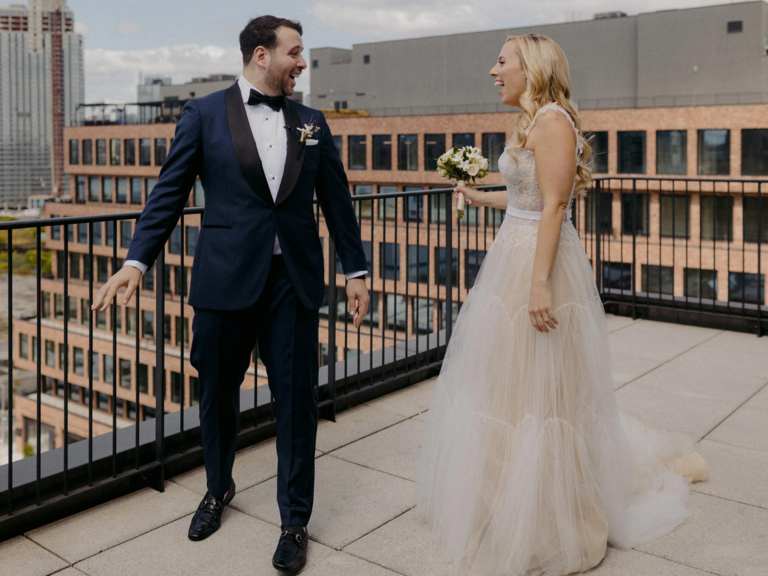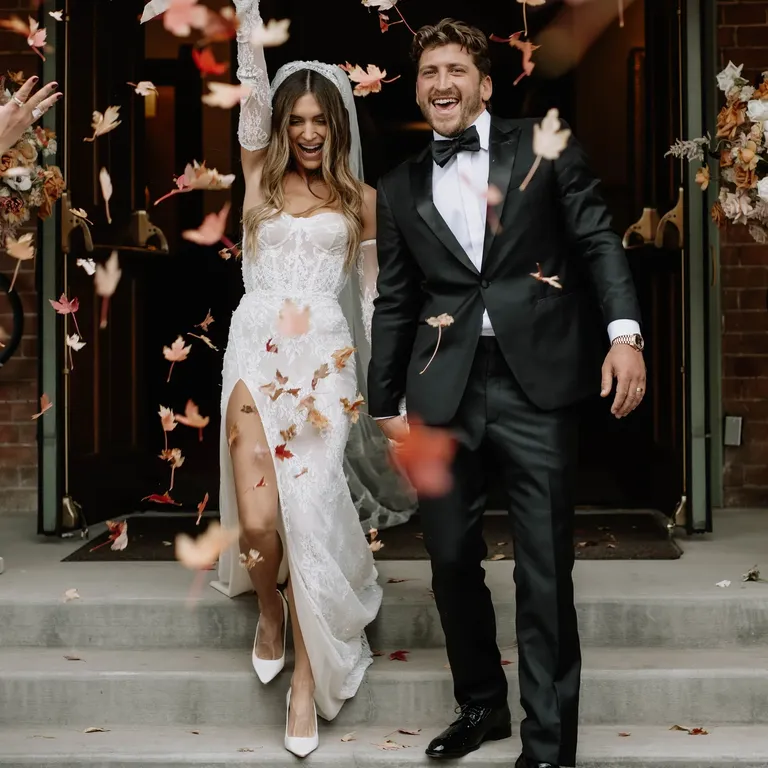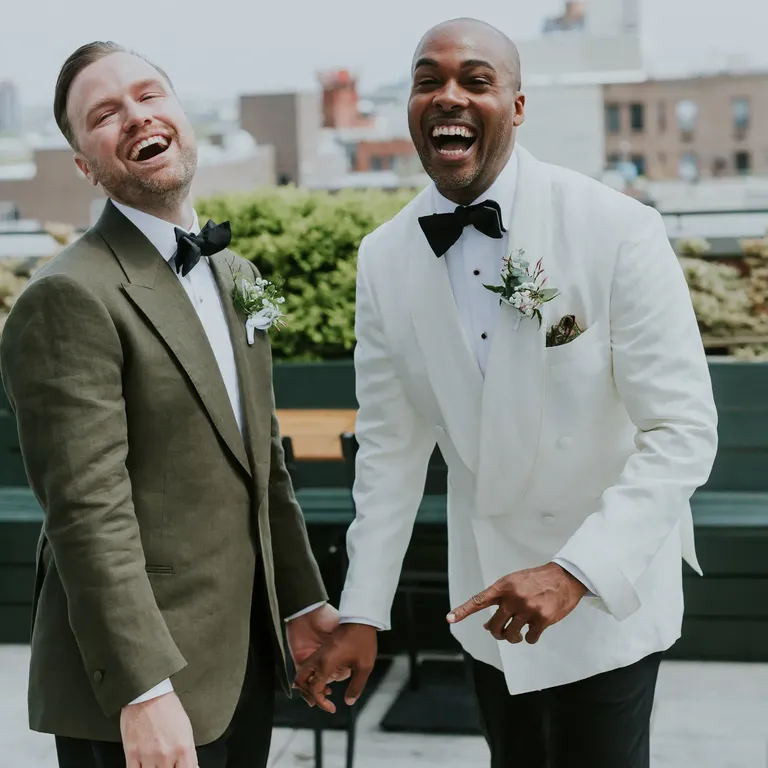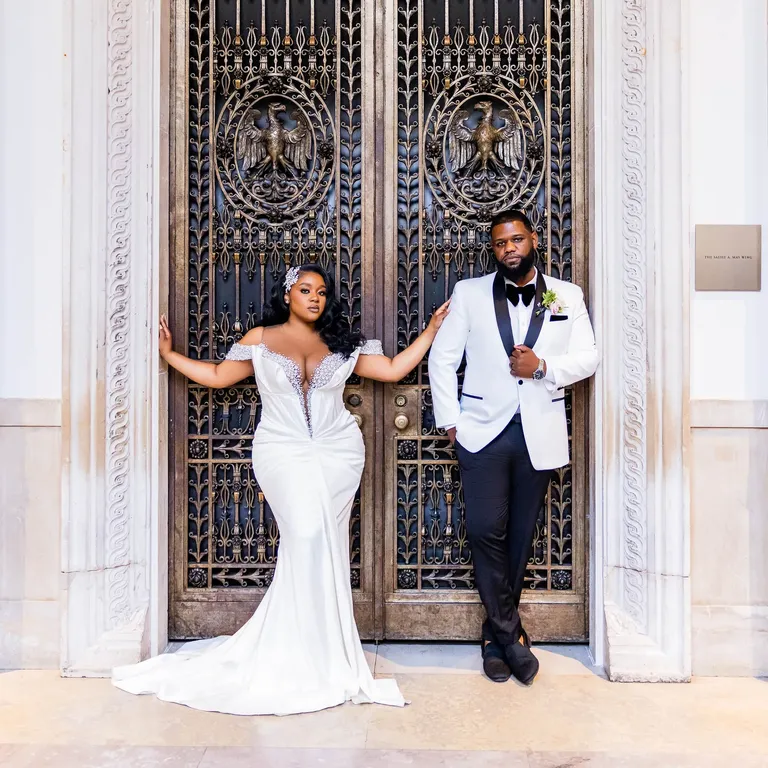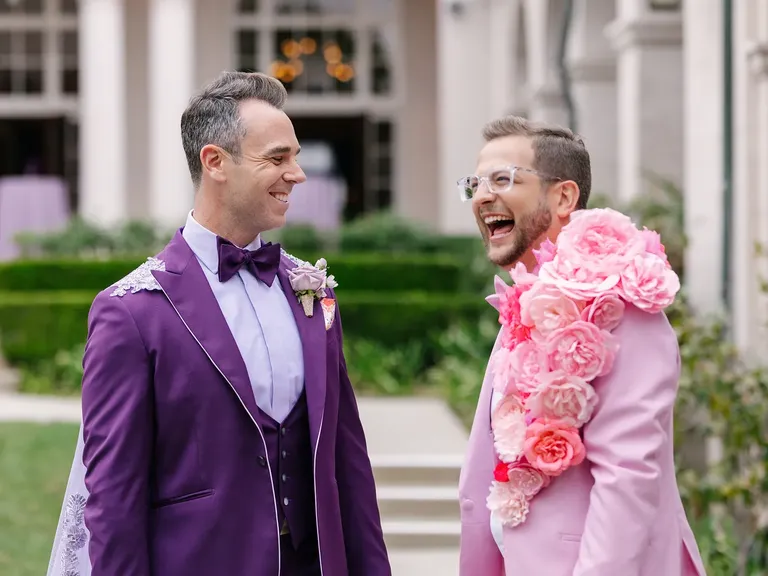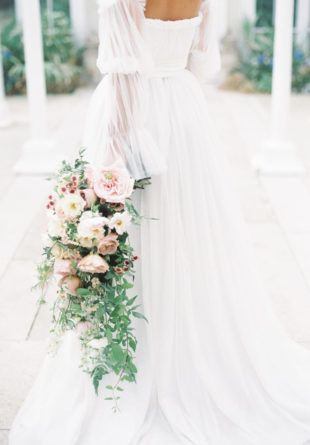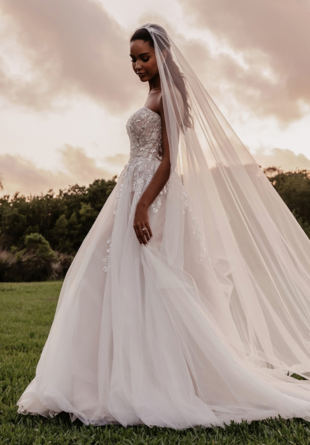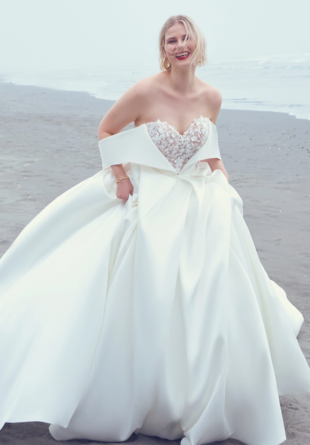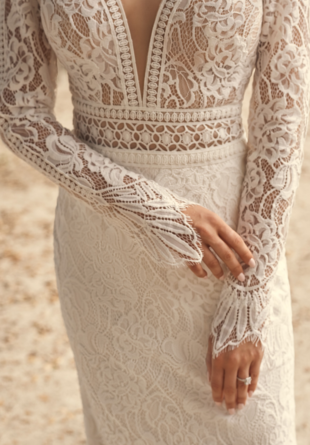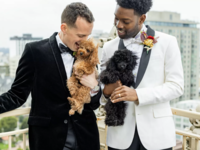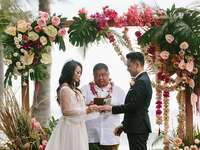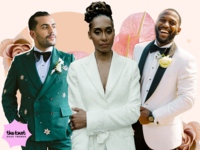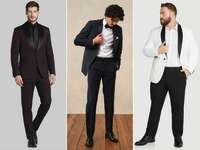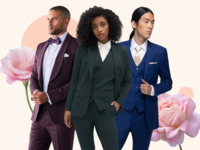The Ultimate Guide to Tuxedo Styles
Dressing for a black-tie wedding means immersing yourself in the world of tuxedo styles. Unlike suits, tuxedos are a pretty regimented garment. They need to have certain features to be appropriate for black-tie events. But just because they're more rigid in form doesn't mean there aren't a ton of different tuxedo styles to choose from. Some are better for certain events or environments than others while others have features that are generally more versatile. For everything you've wanted to know about tuxedo styles (whether you're buying or renting), how to wear them, and what to wear with them, read on.
In this article:
Parts of a Tuxedo
Wondering exactly what makes a tuxedo, well, a tuxedo? It's not quite as complicated as you may think. The difference between a tuxedo and a suit comes down to a few select details that set the former apart from the latter.
Tuxedo Basics
Ultimately what makes a tuxedo comes down to some select detailing. The lapels and the buttons of a tuxedo jacket will be made of satin, which stands in contrast with the fabric the tuxedo is made of. There will also be a satin stripe down the leg of the tuxedo pants. There are also tuxedo-specific accessories that aren't going to be worn with a regular suit. Tuxedos require a tuxedo shirt rather than a traditional dress shirt (more on this later), and while cummerbunds aren't required, they're often utilized in styling tuxedos (you can't wear a cummerbund with a suit). Lastly, single-breasted tuxedos feature a single-button closure rather than two or three.
Tuxedo Jacket Styles
Tuxedo jackets don't quite have the variance in style that traditional suit jackets do. The biggest differentiating factor (outside of whether or not the jacket is double or single-breasted) is the lapels. There are three particularly popular styles of tuxedo lapels, including:
- Notch Lapels: Notch lapels are the most common lapel style for traditional suits, featuring two lateral points.
- Shawl Collars: Shawl collars are exclusive to tuxedos and feature a smooth, sleek looped lapel without notches or peaks around the jacket.
- Peak Lapels: Peaked lapels are a popular flourish in European tailoring. This style has the lower point of the lapel peak up over the upper.
- Double-Breasted Jackets: Not a lapel style exactly, but a double-breasted tuxedo features a traditional double-breasted suiting closure. With very rare exceptions a double-breasted tuxedo will feature peaked lapels.
In terms of other styling notes, tuxedos traditionally don't come in as wide an array of colors as suits (and they will rarely if ever feature patterns). Tuxedos are traditionally made in black, with popular alternatives coming in navy (with black lapels) and white (sometimes with black lapels, sometimes with white ones). You can technically find a tuxedo in any color from brown to green to purple, but if we're talking about the standards, these are it. Most tuxedos, save for the satin detailing, are made from wool, though there are alternative options available in fabrics like linen or flannel. These are rare, though.
Tuxedo Shirt Styles
Tuxedos are always accompanied by a tuxedo shirt. A tuxedo shirt is the most formal kind of dress shirt and shouldn't be worn with a traditional suit (nor should you wear a tuxedo with a traditional dress shirt). As with tuxedos and suits, the difference between the two comes down to the details. For starters, tuxedo shirts are always going to be made of a cotton blend. Linen, silk, and flannel blends should be avoided here. From there, you're going to want to take note of the collars, bibs, plackets, and cuffs.
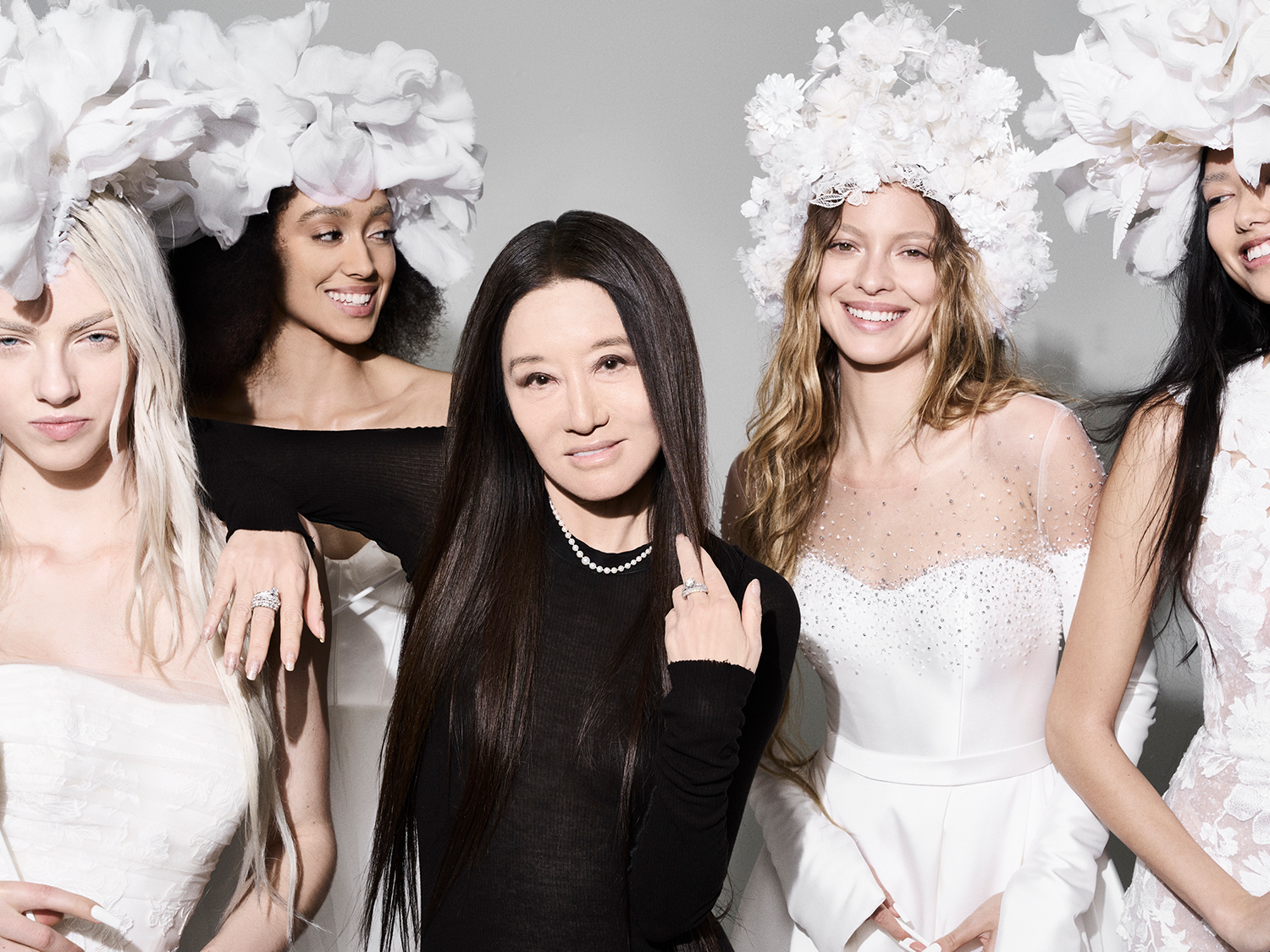
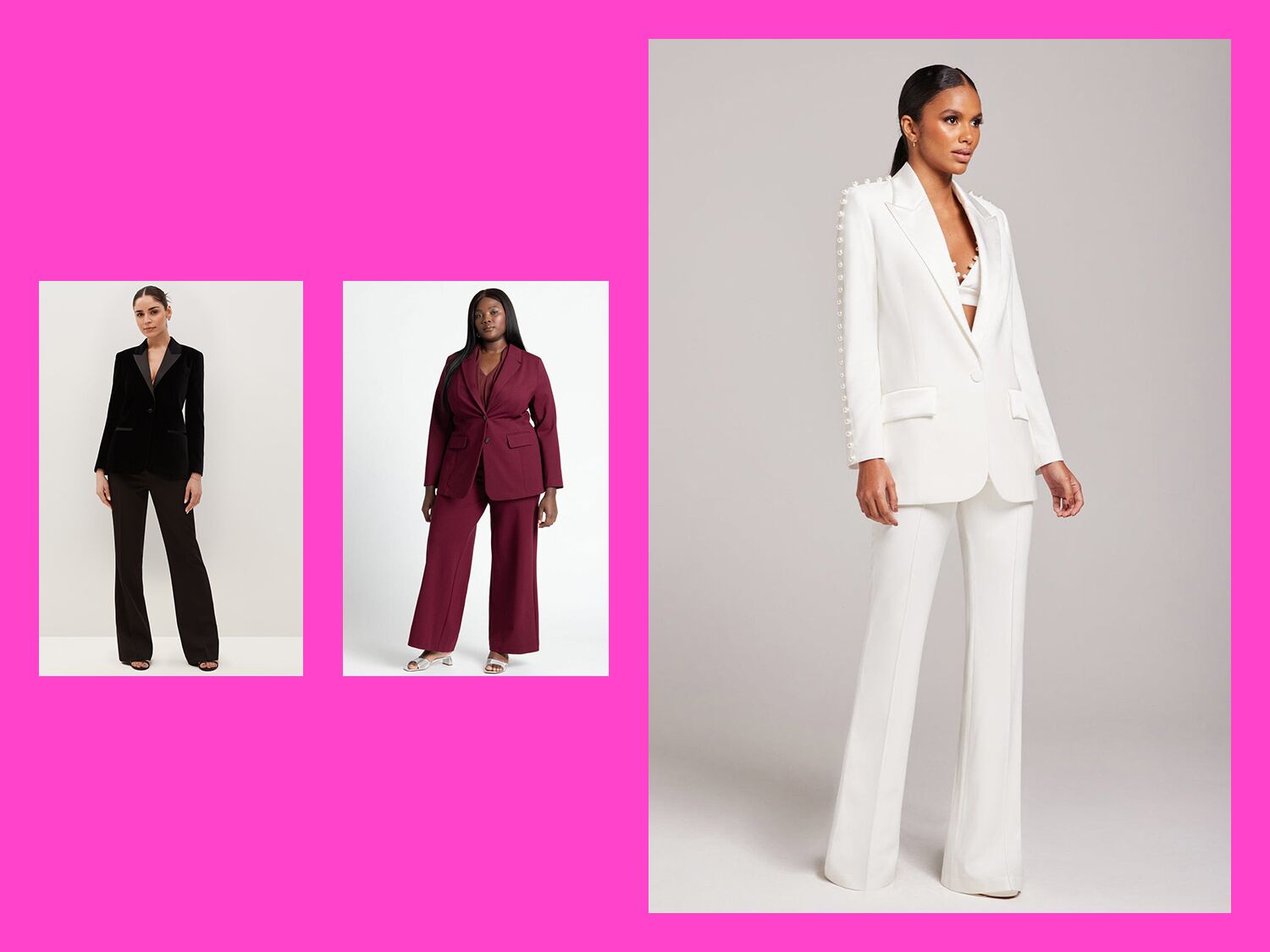

- Collars: Most modern tuxedo shirts will feature a semi-spread collar similar to that which you'd find on a traditional dress shirt. For even more formal occasions (think the kind where you're wearing a full tuxedo set with a cummerbund or waistcoat) you may opt for a wingtip collar.
- Buttons or Studs: Some tuxedo shirts feature traditional shirt buttons while others feature special stud fasteners. Tuxedo studs are an elevated touch for a tuxedo shirt and will require a shirt with a specific style and placket to accommodate them.
- Plackets: If your shirt has traditional buttons, it's going to have a covered placket, which features a fold of fabric that lays over the buttoned placket, obscuring it from view.
-
Bibs: Tuxedo bibs come into play when you're buttoning your shirt with studs rather than traditional buttons. The three styles are a pleated bib front, which features pleated ridges of fabric across the chest. There's also a piqué bib front, which is plainer and doesn't have any extra fabric flourishes. The bib is defined but that's it–a clean and simple look.
- Additionally, there are bib-free tuxedo shirts that can still be worn with studs. This is known as a plain tuxedo shirt front–it's still just as formal as the other options, just simpler in design.
- Cuffs: Being as formal as they are, tuxedo shirts are going to have French cuffs. This means that a tuxedo shirt will require cufflinks–prepare accordingly. Don't be like the member of my best friend's wedding party who had to improvise with safety pins the day of the wedding. You cannot wear French cuffs without some sort of link to hold the cuff in place.
Tuxedo Pants
The big differentiating factor for tuxedo pants is the aforementioned satin stripe, which runs down the outside seam of the leg. However, another crucial difference is in the waist. Traditional tuxedo pants don't feature belt loops but rather tabbed waist adjusters (or in some cases tailored waists to fit the wearer).
Tuxedo Accessories
Unlike suits, which have a lot of variance in terms of the accessories with which you style them, tuxedo accessories and the way you style them are a bit more rigid. This doesn't mean they can't be fun or that there isn't room for wearing a tux your way–you just need to make sure the accessories you choose align with what's usually worn with a tuxedo.
- Tuxedo Ties: Tuxedos are traditionally worn with both bow ties and normal ties (you can wear either with a spread-collar shirt but if you're wearing a tuxedo shirt with a wingtip collar, you need a bow tie). That said, this is where the "black-tie" element comes into play–your tuxedo tie is not the time to mix in ones that feature quirky patterns, the Superman sign, or the logo of your favorite basketball team. Tuxedo ties should be black.
-
Cummerbund or Vest: Neither of these are required accessories but if you're aiming for a particularly formal take on black-tie (which is already fairly formal), you're going to want to wear either a cummerbund or a vest. A tuxedo vest is going to be similar to a traditional suit vest. You'll sometimes see folks use these as an opportunity to add a pop of color to their tuxedo (I wore a purple vest to my high school prom, though if you're getting married I would not advise taking inspiration from what I wore to my high school prom) but for more formal affairs like weddings, you're going to want to stick to black or white.
- A cummerbund is a satin accessory that wraps around your torso and aims to cover your waist. They feature a series of pleats in the fabric that give it a sort of ridged texture. When wearing a cummerbund the pleats should face upwards–ostensibly so that while you're eating any drifting crumbs will be caught in them.
- Vests and cummerbunds are not required when wearing a tuxedo. That said, you may want to select one or the other if you're attending a more formal wedding–they're great for black-tie weddings whereas black-tie optional or formal dress codes may be a good opportunity to leave both in the closet. Whichever you wear comes down entirely to personal preference. There's no occasion in which one would be required while the other would be a faux pas. If you want to wear one, just keep in mind that you can't wear both. It's vest or cummerbund, never and.
- Suspenders: As previously noted, tuxedo trousers don't feature belt loops. Many will include side tabs so that the waist can be adjusted to the wearer accordingly, but some opt to go with suspenders. They're a dapper touch to a tuxedo on a pure aesthetic level, but they can also serve the function of holding your pants where you want them to hit. Sometimes side-tabs just aren't cutting it. Whether or not you wear suspenders with your tux is up to you–there are no rules of formality dictating an appropriate time or place for them.
-
Tuxedo Shoes: Tuxedo shoes are traditionally a whole cut oxford dress shoe made from patent leather. For black-tie optional and formal dress codes, you can sometimes make a cap-toe oxford or one made from regular black leather rather than patent, but if you're dressing for black-tie occasions you should wear tuxedo shoes.
- The exception to this rule is tuxedo loafers, which are usually made from velvet. This gives a tuxedo a bit more of a laissez-faire vibe (I'd personally recommend wearing them with a shawl collar tuxedo jacket), so it might not be the move if you're dressing for a more formal wedding. And in the instance of nuptials, given that these are a bit of a flex, they're probably best left for the groom and groomsmen to wear (though I should note that this is my take, not a hard rule).
Wedding Tuxedo Styles and When to Wear Them
So, you've got a black-tie (or black-tie optional) wedding coming up and need to pick out a tuxedo. Black tie dress is a bit more limited due to the rigidity of the rules, but you'll have a few different options to choose from depending on the vibe, the venue, and bringing your own personal touch to the look. Here are the most significant wedding tuxedo styles and our best advice on how to style them.
Single-Breasted Tuxedo
When to wear it: Any time, any place.
Wear it with: Your standard tuxedo accessories–tie, cummerbund, etc.--though I'm personally partial to a regular tie over a bow tie with notch lapels.
Double-Breasted Tuxedo
When to wear it: This one is right at home at more upscale venues. Think of historical sites, estates, and churches.
Wear it with: Double-breasted tuxedos have a regal vibe. Wear these with a thick bow tie and consider throwing in a boutonniere.
White Tuxedo
When to wear it: You can wear a white tuxedo when you're the one getting married and only when you're the one getting married. Seriously, steer away from white when you're a guest.
Wear it with: The usual tuxedo accessories, but with the understanding that any pops of color (be it from your cufflinks, pocket square, etc.) will stand out even more against the white.
Creative Black Tie
When to wear it: When the dress code calls for it!
Wear it with: Whatever you want–a creative black tie is all about styling things your way and breaking the rules. Try a shirtless tuxedo look, or a sheer shirt underneath your tux. Accessorize freely, try loud patterns, add a hat, do anything to break out of the confines of a traditional black tie (just be sure to incorporate the general trappings of a tuxedo, i.e. a jacket).
